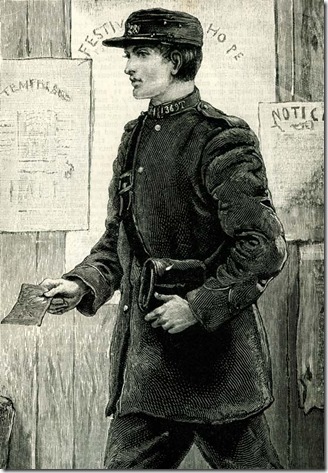by Frederick Sherlock:
Everybody knows the telegraph messenger. All over the kingdom, in town and country, his bright, smart uniform is to be seen and, next to the postman, no public servant of the Queen is more in request. His office is one of great responsibility and usefulness; and if on any given day the electric telegraph suddenly came to an end, business would speedily become disorganised, and a great inroad would also be made upon the happiness of many homes.
The messenger has no knowledge of the contents of the brown envelopes which are put into his hands to deliver with all speed. When he knocks at the door and hands in his message, he cannot tell whether he is a bearer of good news or ill. Sometimes his visit means nothing but sorrow. It may be the loss of the breadwinner by a fatal accident; or the news of a loved soldier son’s death in a far-off clime; or the tale of an attached daughter’s end in a London hospital after a lingering disease. Ah, well! for good or ill the telegraph messenger bustles about day after day, proud to be in Her Majesty’s service, and conscious that his calling is of real use to the community.
The conditions on which boys are taken into the service are not without interest. The limits of age are from 13 to 15.
Candidates between 13 and 14 must be at least four feet seven inches in height, without boots, and candidates between 14 and 15 not less than four feet eight inches. They must have passed Standard V of the new Educational Code, or some equivalent test, and are required to produce a satisfactory certificate of health from their own medical attendant, and certificate of having been satisfactorily vaccinated within the last seven years.
Duty does not commence, as a rule, before 8am and it continues for nine hours. The wages are 7s a week, rising by 1s a week annually to 11s, and uniform is supplied, including boots. All candidates have to sign a declaration, stating they are fully aware that this employment will not entitle them to promotion, compensation, or pension. That their services will be discontinued on their attaining 16 years of age, unless they then succeed in passing a competitive examination for direct appointment as postmen on reaching 18 years of age, or elect to remain two years longer as messengers, on the understanding that if they then enlist as soldiers, they shall, after serving the prescribed time with the colours, have preference over soldiers who have never been in the service of the Post Office, in obtaining employment in that department.
The other day I had a peep at the small Blue Book of ‘Instructions for Messengers in London’, which each messenger is required to produce at every inspection, and also whenever asked for by the messenger’s superior officer. The instructions cover conduct and delivery. Rule 6. ‘You are at all times to keep yourself scrupulously clean, and to have your hair short and neatly cut.’ Or Rule 9… ‘You must take off your cap when in the Office, and you must always be respectful in your manner when spoken to by any person.’ City messengers are specially cautioned against sliding down handrails of the staircases! This is certainly a hard saying, for most health, high-spirited lads are under the impression that sliding down the handrail is an expeditious and graceful way of coming downstairs!
Rules 11 and 12 will command the sympathy of many people. 11. ‘You are strictly forbidden to smoke in or abut the Office, at any time, or in the streets when you are in uniform. Gambling, raffling, playing cards, and practical joking are strictly prohibited’. 12. ‘You must not, on any account, go into public-houses during your hours of duty except to deliver telegrams,’ which leads me to say that the Post Office.
At Christmas time severe temptations are placed in the way of the postmen and telegraph messengers. The ‘Christmas Glass’ has been the ruin of many fine fellows. Let us hope that this year the Christmas box to the postman and to the telegraph messenger will be in current coin, so that the receiver may take it home, and spend it in the way he thinks best, or put it by in the Savings Bank for the rainy day which is sure to come when least expected.
From Church Monthly 1893, pp336-338. with permission of Aysgarth PCC. The illustration was drawn by H Johnson
